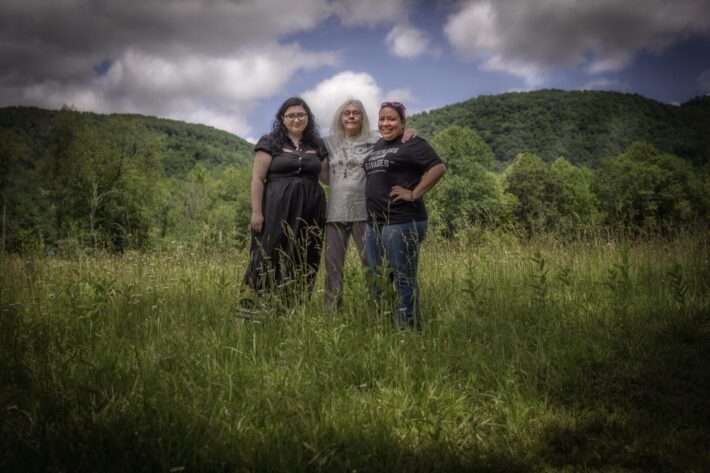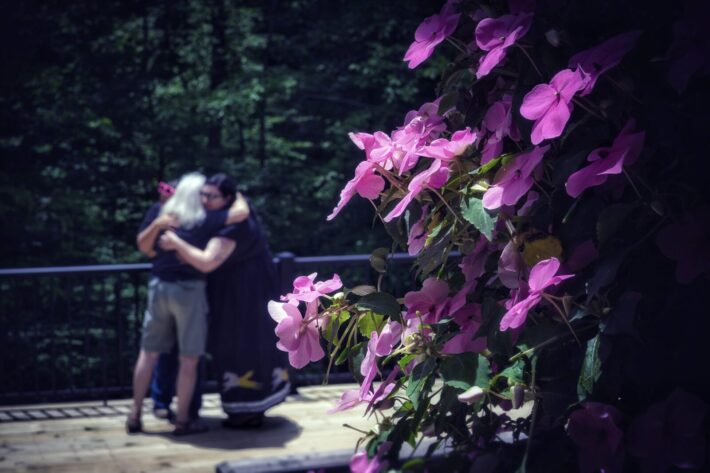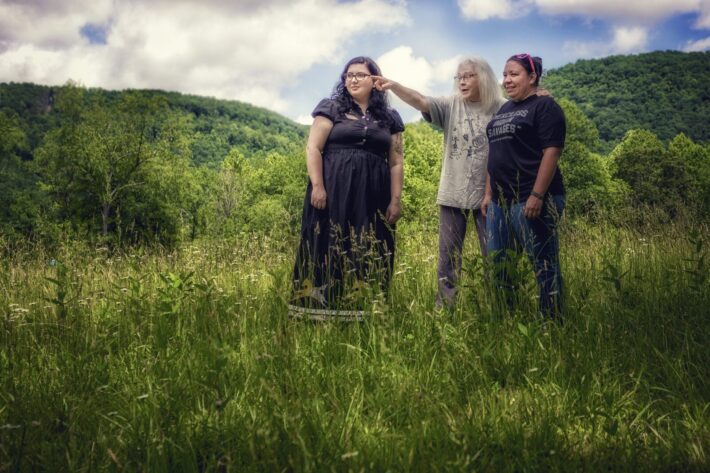“When we fight together, we become closer. I would just love the world to know how amazing Jane is in this selfless act. People who she will never meet are going to benefit from the gift of this land.”

Jane Branham has been in a lifelong relationship with the earth in Appalachia. It’s where she was born and raised in Wise County, Virginia. It’s where she returned in adulthood, shocked and catapulted into a second career as an activist after seeing mountaintop removal mining for the first time in the 80s. Appalachian land has formed Branham and her family, and when she inherited some acreage from her father in 2021, she knew that it wasn’t hers to keep. In early 2025, she formally donated her land to the Appalachian Rekindling Project (ARP).
The region-wide initiative will use Branham’s gift and other donations to establish and sustain an intertribal Indigenous center where Native people can gather in central Appalachia. The Rekindling Project also rematriates land donations, or cares for and protects the land collectively with a centering in Indigenous knowledge methodologies.
Faith and Money Network spoke to Branham in conversation with Appalachian Rekindling Project co-executive directors Taysha DeVaughan and Tiffany Pyette about this gift, their hopes for the land, and how they see rematriation as a vital form of liberation.
Brittany Wilmes, Faith and Money Network: Tell me a bit about yourselves and your work.
Taysha DeVaughan: I’m an enrolled member of the Comanche Nation of Oklahoma and a member of the Caddo tribe of Oklahoma, specifically the Hasinai band. I’m the co-executive director of the Appalachian Rekindling Project and the executive director for Alliance for Appalachia. I’ve lived in Wise County for 15 years and am originally from Oklahoma. I’ve been a member of Southern Appalachia Mountain Stewards (SAMS) for about six years, and have served as secretary and president.
Tiffany Pyette: I’m a Cherokee descendant, and the founder and co-executive director of Appalachian Rekindling Project. I live in Kentucky and am from Wise County. I serve as a board member for SAMS and like many local organizers, I build capacity for a lot of organizations. I’m a program officer at the Appalachian Community Fund and a visual multidisciplinary artist, storyteller, and poet.
Jane Branham: I’m originally from Pound, Virginia, and grew up in Wise County until I moved to change the world at 18. I’m a retired registered nurse and have been a volunteer and active member for Southern Appalachian Mountain Stewards since 2008. For many years, I stewarded almost 17 acres of land that was given to me by my father in 2021. When I heard Taysha and Tiffany speak about the Appalachian Rekindling Project, I saw the opportunity for somebody to do something great with this land.
Wilmes: Tell me more about the Appalachian Rekindling Project.
Tiffany: I first had the idea for the Appalachian Rekindling Project in 2023, when I visited a similar project in Canada. There, they had a physical space funded by a voluntary land tax. I saw firsthand what that shared tribal infrastructure looks like.
When I came home, I was sure of what needed to be done, of what could be done. I knew that people would believe in a decolonized Appalachia when we could show it to them, when we could take them there. I started thinking of a physical space and of things that would be powerful for people to be able to access.
So much of our planning phase was spent dreaming about what it would mean for our community to be able to interact with land in the way that we know we should be able to, because so many of our cultural teachings involve good relationship with land. We’ve been locked out of a lot of the relationships with land that Indigenous people should have in Appalachia due to extractive industries grabbing up everything in sight.
And then Jane blessed us with land literally the day after we officially launched to the public.
Wilmes: When was your official launch date?
Taysha: April 20, 2025.
Wilmes: Jane, can you say a bit more about your family’s land and why the idea of rematriation appealed to you?
Jane: My dad died four years ago, and at that point I had stewarded the land for many years. I never would have felt right profiting from the land or anything like that. I built a partial road through the field many years ago, and my ex-husband found a white spearhead in the ground. It reminded me of how many camps Native Americans have had down there.
When I heard Tiffany and Taysha speak about their ideas at a conference in West Virginia, their presentation just hit me, and I thought, “God’s trying to tell you something, this is what you can do.”
Taysha: We were in Charleston, West Virginia. We were there for two different reasons, but happened to be in the same hotel. On the drive home, Jane was saying, “I know ARP was up here. You know I have land, Tay!”
We cried and hugged. It was a full-circle moment. It felt good. The creator was really talking to us that day.

Wilmes: What are your ideas for this land?
Taysha: We have two different properties — a space in Virginia and a space in Eastern Kentucky. The Virginia land from Jane will be our homecoming space.
Tiffany: We have 63 acres in Lecher County, Kentucky, that we purchased to stop the construction of a federal prison. It was strip-mined land and also went through some deep mining, although that occurred in the 60s when it wasn’t required to be recorded. There, we will be restoring a population of bison to the land to help fix the soil because bison are a keystone species. On both properties, our goal is to protect what’s there and to prevent harmful industries from coming in.
Wilmes: What does financial support look like for the Appalachian Rekindling Project?
Taysha: Voluntary land tax is our primary source of income right now. Tiffany networked with the Sogorea Te’ folks and they helped us calculate rates and understand how to create a voluntary land tax calculator. That’s the primary way we receive funding from a community perspective.
Tiffany: While land tax is our sustaining model, we also accept donations from foundations, private individuals and other groups. Right now, we’re raising money to fence our Kentucky property. We’re also very open to land and in-kind donations (e.g., farming equipment). I should also say that voluntary land tax payments are tax-deductible and help support Indigenous presence in Appalachia. It’s a way to be a really good partner in community with us.
Wilmes: Is there anything else you’d like to share?
Jane: I just want to say that in the last two days, they’ve started building a road into the property in Powell Valley here in Virginia. Part of the money that the Rekindling Project has raised is for infrastructure into the property. I can’t wait for y’all to see it!
Taysha: We’re definitely in the infrastructure phase! What’s important for our project is the rematriation focus. We talk a lot about being in good relation with each other, with the land, and as good stewards of our beings. We’ve had a lot of harm caused to this place by a mindset of extraction. This is a direct counter-offer of healing. It’s not just environmentally and economically feasible, but it’s healing people as we do this. Our work is uniquely positioned to bring together cultures who historically have been made to be separated and pitted against each other.
Wilmes: Let’s talk a bit more about that idea. What does rematriation look like in action for the Appalachia Rekindling Project?
Tiffany: We recently had a beautiful day of planting trees and seeds, food forest-style, on the property in Virginia. So many kids came out to help. We had little ones come out and they’re going to grow up with access to the property. We had trees that were nearly wiped out due to blight, so getting to restore them to the property was beautiful.
Wilmes: What did you plant on the property?
Jane: Blight-resistant American Chestnuts. There were elderberries, hazel, and chokecherry.
Tiffany: We also planted some Three Sisters arrangements (corn, beans, squash) that grow well together because they’re supposed to be together.
Taysha: Tiffany gave us a Cherokee planting song that we sang together before we planted. It’s really all part of the framing of why this is different.
Tiffany: Rematriation is about being able to share pieces of culture as well connecting with the land and inviting people in. Part of our mission statement is that our project aims to rekindle relationships between the land, each other, and with our traditional practices. That’s the whole thing for us.
Rematriation is a specifically-coined term in Indigenous communities. Where the idea of repatriation follows a certain framework of permission under the guise of diplomacy (and patriarchy), rematriation is about a demand for the return of sacred things back to Indigenous, women-led care. When we’re talking about land, we’re honoring that many Indigenous societies are matriarchies.
It’s an intentional choice to say, we need the value of women’s leadership, and we also acknowledge that the land is deeply sacred, and it’s not just property to be signed over between two parties. It’s a relative and we’re welcoming her home.
Taysha: It’s a different mindset that doesn’t lead back to patriarchy and capitalism and colonialism.
I also just want to highlight what Jane did that day in gifting her land to us … I cannot underscore the momentum that that has given this project. When we fight together, we become closer. I would just love the world to know how amazing Jane is in that selfless act and that ability to see generations ahead. People she’s never going to meet are going to benefit from the gift of this land. That generosity will always be a big part of our story.

Jane: Thank you, Taysha. We’re not taking anything with us, so I feel like, if you do the right thing, it’s going to domino down and good things will come from it.
Tiffany: Jane is leading the way for how people can be in right relationship with Indigenous communities. I also think it might be helpful to know that this land is culturally and historically significant. It was very heavily fought over for Cherokee and Shawnee folks to hold that territory. Now, descendants of those people will get to come back and experience the land themselves, and that’s really powerful.